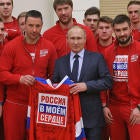Russia may be in jeopardy of missing the 2020 Tokyo Olympics. The World Anti-Doping Agency revealed Monday in an executive committee meeting in Tokyo that they've found "inconsistencies" in data given by Russia's anti-doping agency, according to The Associated Press.
Russia has been given three weeks to explain the accusations of tampering with doping data, and the country's officials believe the investigation could lead to Russian athletes being banned from the 2020 games.
"The situation is very serious," Russian Olympic Committee president Stanislav Pozdnyakov said in a statement.
He put it bluntly, adding that if the country cannot explain differences in data, defend themselves or identify possible suspects "then the Russian Olympic team's prospects of taking part in the Games in Tokyo next year could be under threat."
Russia's anti-doping agency, Rusada, has been suspended before, and turning over data was required of the group in order to lift the suspension. That suspension, lifted in 2018, came after the country had planned and executed an in-house doping scheme that impacted many sports events including the Olympics.
The reinstatement of Rusada has not received everyone's support, and some believe they should not have been allowed back in after not following exact direction and protocol. Director General Olivier Niggli told the AP that he does not regret the reinstatement.
"I believe it was actually a very important decision and absolutely the right decision," he said. "I'm convinced that we would not have the data if we had not taken that decision, so we would not even be talking about it today. There would still be a cloud of suspicion and nothing would have gone forward."
The first red flag came in July when WADA began to investigate "some differences" between data from the Moscow lab and data handed to them in 2017 by a whistleblower. In January, WADA was given data that had until then been in the hands of Russian Law enforcement in a closed laboratory, despite a December 31, 2018 deadline for Russia. The data given helped with the case of 12 Russian weightlifter suspensions.
If in fact the data was changed, Russia knows they could be facing a ban from the next Olympics.
Pavel Kolobkov, Russia's sports minister, is not clear on what the differences between the data are, but vowed to help as much as possible with the investigation.
"What, exactly, these inconsistencies are and what they are related to, that will be cleared up by experts in the field of digital technology from both sides, who are already cooperating," he said. "From our side, we will continue to offer all possible assistance."
In the last Winter Olympics, due to doping wrongdoings, the International Olympic Committee only allowed Russia to send a small neutral group titled "Olympic Athletes from Russia." That case is considered closed but the IOC has said it "fully respects this process" of the WADA investigation. There is no timeline for a decision from WADA at the moment.
The case comes only a few days before the track world championships in Doha, Qatar, where 30 Russians are competing as neutral athletes, given the suspension of Russia's track federation.
















